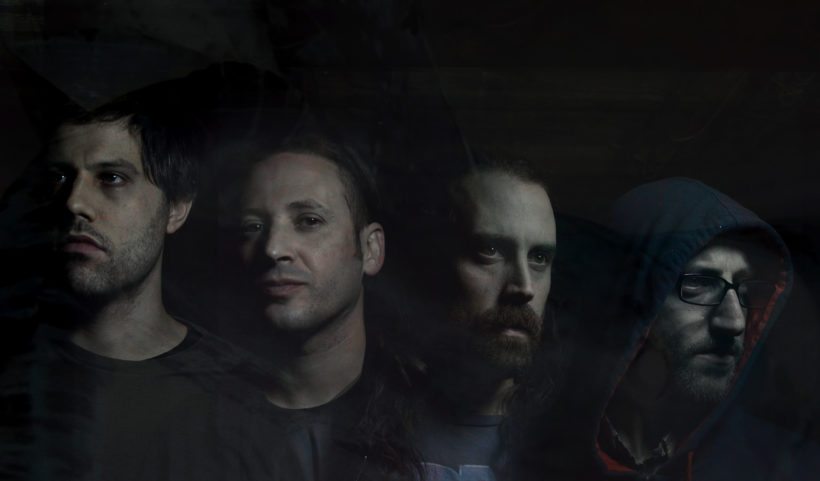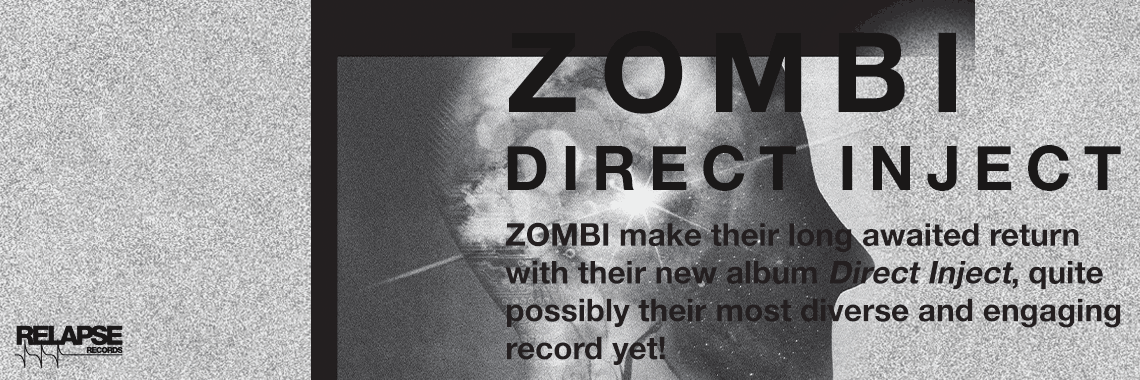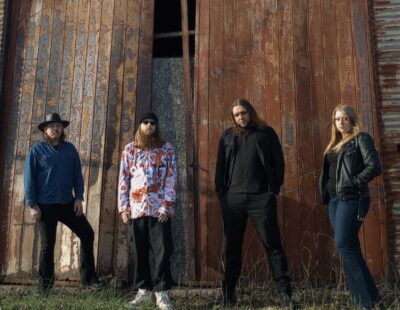
If you’re not listening to Cleric’s astronomically weird Retrocausal yet… I don’t know, maybe you’re still spinning the John Frum record on repeat, one of guitarist Matt Hollenberg’s vast network of other projects. If that’s your reason, then it’s a damn good reason, just remember to come back to this post when you have some time. Otherwise, you should probably be listening to Retrocausal right now. Nothing else in your collection quite matches the hypercolor blend of idiosyncratic and cinematic compositional choices, wicked jazz chops and death metal’s demand to burn it all down.
A month ago, we treated you to a song from the new release, and now that it’s available to the public, we wanted to give you more of a behind-the-scenes look from the mouths of the dudes who made it. Some of our interview found its way into this month’s magazine (Issue #160, February 2018, Tribulation cover), but be sure to check out the rest of what was said here, including musings on quantum physics as related to Stephen King and Thom Yorke.
Can you talk about how you got in contact with Web of Mimicry, and how that relationship has continued through the release of Retrocausal? How does Cleric fit on that roster?
Matt Hollenberg (guitar): We had all been long time fans of Web of Mimicry and Trey [Spruance]’s music. We are all huge Secret Chiefs 3 and Mr. Bungle fans, and we jumped at the chance to be on the Web of Mimicry roster, as we hold all the bands on that label in extremely high regard. We initially got in touch with Trey in 2009 when he came through with the Secret Chiefs 3 and played the First Unitarian Church sanctuary. At the end of the show we handed him a demo of “Rush of Blood,” the third track from Regressions. A few weeks went by and we didn’t hear anything and then the Hard Times blog had interviewed Trey, and ask him if he liked any new bands that were out and he mentioned our demo that we had given him. Naturally we were ecstatic and wrote him immediately, and this was when he offered us a spot on the Web of Mimicry roster. What we feel we share with the other bands on Web of Mimicry is the spirit of exploration and adventurousness. We have an aesthetic in our sound that isn’t shared by many of the Web of Mimicry family but what ties us to the other bands is our spirit of experimentation and adventurousness.
Nick Shellenberger (vocals/keyboards): Our first chance to play a lot of the Retrocausal stuff consistently was on tour with Secret Chiefs in 2014 and we carried that more or less straight into the studio. It was huge to test the waters of all that new stuff in front of those musicians every night and get a sense of what we had on our hands. If it was bullshit, Trey would have told us, but they were all really engaged by where we were going, which I think was important.
Matt, how is your role different in your various other projects (John Zorn’s Simulacrum ensemble, John Frum, etc.) than with Cleric?
Hollenberg: Each project is its own self-contained little universe that has its own rules. The thrill of collaboration with different personalities is what I really enjoy. With regards to Simulacrum, it is very different than Cleric in the sense that I am not making any artistic decisions; all I am doing creative-wise is improvising. Besides that I don’t really decide anything creative about the pieces in Simulacrum. Zorn decides whether the piece will be heavy or clean, what the drumbeat will be, what the aesthetic is, etc. My only role in Simulacrum is to play the guitar the way Zorn wants me to. This is very different then Cleric in that Cleric is all my music that I wrote and collaborated on. John Frum is different from Cleric in the sense that it is more confined to a specific aesthetic. Within that aesthetic there is a lot of room for creative decisions, but because that band contains different people the end result is very different than Cleric. The influences for John Frum are also more overtly “metal“ than Cleric. Even though both bands are heavy bands they don’t really relate aesthetically or compositionally so it is fine to get ideas from both and feed each band ideas and elements that are discovered from doing both.
What work have other members of the band been involved with since Regressions?
Hollenberg: I have done six Simulacrum records written by John Zorn and performed by John Medeski, Kenny Grohowski and myself (Simulacrum, True Discoveries of Witches and Demons, Inferno, The Painted Bird, 49 Unspeakable Acts of Depravity in the Life and Times of Gilles de Rais, The Garden of Earthly Delights). Also collaborated and was a primary songwriter on John Frum’s A Stirring in the Noos. Also in August, Tzadik released my solo album entitled Shardik with Matt Buckley on drums and Nick Shellenberger on bass and synth. In 2015 I played guitar and was a primary songwriter for Cetus and their record Remnant Mass that was released on Dullest Records. In 2016 I also was a primary composer and guitarist for the iNFiNiEN record Light at the Endless Tunnel which was universally loved in the prog community.
Shellenberger: We also did a few film scores, shortly after Regressions came out, and ended up with a bunch of stuff we were really proud of that didn’t end up getting much time in the actual films. I did the score for a really awesome horror/thriller podcast (The Sound of a Mother Screaming) that our old friend, James Brown, wrote and recorded over several years. The music, like with the films, sprouted from a really tiny theme, in this case two notes, and then spread out from there, which happens with Cleric also but often on a much more tangential path. I also recently recorded a solo EP with Colin [Marston] that will come out as soon as I know what to call it, and Dan [Kennedy, bass/guitar] has been writing a lot of crazy shit for another offshoot project. Everyone except me has also done a fair amount of improvising in various contexts, and I think much more so than around the time that Regressions came out; Larry [Kwartowitz, drums] and Matt both in some Zorn sessions at the Stone and elsewhere, Larry with a number of people, including Mick Barr, Matt Mottel, and Ron Anderson (who he later joined as a new incarnation of Pak) and Dan in and around the Philly area.
Larry Kwartowitz (drums): We love having the opportunity to explore other musical and artistic concepts in side projects outside of as well as within the band. We all have a natural desire to be multi-dimensional as musicians, as we all have such eclectic tastes in music. We feel very fortunate to have the chance to work with musicians and artists that have inspired and influenced us in so many ways, for so many years and we look forward to working on more collaborations within and outside of the band more in the future.
How has the dynamic of the band shifted (or not) since the last time you wrote and recorded an album?
Shellenberger: It’s different because a lot of the early versions of these songs took shape before Dan was in the band, so there was a period of re-learning the language with one another and kind of shaping a new unit while also learning new material at different stages of understanding. It felt natural pretty quickly though, and because we were learning a lot from demos, and because Dan is such a talented player and composer himself, each time we dove into a new song it felt somewhat complete almost immediately. That kind of fits the Retrocausal vibe also. It was like the songs existed before we knew them, whereas with Regressions, we often slogged through playing and replaying sections and making slight changes over months and years that it was like we were living inside those songs forever, so we knew every step of every detail in a kind of heinous detail.
What is the relationship between the music and the concept for the album? Which tends to come first, and how do they affect each other?
Shellenberger: In both cases (Regressions and Retrocausal), the music came first and the concept evolved during the writing process, and both times the working song titles sort of informed the lyrical context of each song within the story. Regressions told a really tragic, violent, hopeless story because it felt like that musically, whereas the songs on Retrocausal had more of a wonder and a hugeness of scope to them so the concept took on more of that and placed it in the context of science fiction, as probably inspired by some of the sounds and moods on the record that weren’t present on Regressions. We’ve always referenced sci-fi as an atmospheric influence and this record seems to have captured that really clearly, so it made sense that the concept would occupy that territory also.
What process has this music gone through? Do you have a pattern in the way the songs are written or worked on? Has this approach changed at all since your last album writing sessions?
Hollenberg: A lot of the songs started out as demos on Logic that we pieced together in a cut-and-paste fashion. Once we were satisfied with the structure of a piece we would begin to start learning it as an ensemble. Sometimes the learning curve was very steep, other times it happened rather quickly as we were all listening to the demos a great deal so that by the time we would play a piece it would come together rather quickly. Many of the foundations of the songs were constructed over intense 12-hour writing session, just right through the night tripping out on stuff we were making and trying to stay excited the whole time. The way this is different from Regressions is we didn’t even have knowledge of how to use logic during that time, so our song charts were incredibly convoluted doodles that only we could follow. We started to get very interested in elastic time and putting different tempos on top of each other in the same “big beat” space. We are very interested in that idea, before we had ever started experimenting with playing music in that way. This was not a rhythmic element that was present on Regressions in any emphasized way.
Shellenberger: I also think, because the structures were more concrete earlier on, it gave each member more room to wade through an idea and bring it into the music in its own time, as opposed to when we were all standing in a room together trying to get through playing it as a group. I know I did a lot more of that with the synth parts and they definitely became more nuanced, while also taking on a larger role. That feels true to me for all of the instruments on this record, more precise and subtle in a way.
Can you talk a little about the album title? Was that choice made because of a particular interest in quantum physics phenomena? And is it meant to relate thematically at all to the name Regressions?
Kwartowitz: I have a deep fascination with quantum mechanics and I think we all share either a belief of – or at least an interest in – concepts such as the multiverse, synchronicity, the flexibility of space-time and retro-causality. As an artist it sometimes feels like you are the conduit or amenuensus of a greater idea that may already exist somewhere in time and space. I’ve heard other artists such as Thom Yorke of Radiohead say the same thing about certain songs (he was referring to “Street Spirit” at the time). A lot of the time we experience synchronicity and happy accidents while being creative, much like the way this album title seems to tie in thematically to regressions even though it was completely unplanned. We are definitely nerdy about certain things and one of them is the Dark Tower literary epic by Stephen King, in which every book in the series has a subtitle that starts with ‘Re.’ We don’t consciously plan on continuing that specific theme but for now, I definitely see it as a happy accident!
Is this music particularly taxing to record? Any interesting/unexpected situations that came up during those sessions?
Hollenberg: Yes, sometimes it is extremely brutal to record, because of our standard and because of the physical difficulty of performing the music. But it is so rewarding when you hit the standard after going through much anguish. It was great recording in Colin Marston‘s studio. There were always great musicians around and we would invite them to record with us. That was how the whole Mick Barr thing happened. Larry was jamming with him, but we weren’t planning on having a track with him on the record it was just an impromptu thing.
Shellenberger: I haven’t recorded a lot of records, but there’s something about recording this stuff that feels like it stays with you the whole time it’s being completed. We did a bunch of sessions, spread out over a pretty long time, and I felt so anxious about it until we actually got the master and then it was like “ok good, it’s cool,” both because we had such a sense of what we wanted it to be, and because it felt so ambitious that with the wrong execution it would just be nonsense. It’s also just so much material and so much density and harshness and sort of exaggerated atmosphere, even in the softer stuff, that there was a brief point for me (I think when we were hearing the whole mix for the first time at Colin’s) where I actually wondered if we had lost our minds, like if anyone would ever want to listen to it or if we had just gone through a wormhole and totally lost touch with reality. Ha! I don’t really feel that way now, but even for me, having been with it so much it was like “shit this is too much.” I don’t think anything else I record will ever feel the way it feels to record this stuff.
Kwartowitz: It’s more complex and intricate than our other projects in many aspects, especially recording. We actually had so many tracks on Regressions that we broke/killed Colin’s computer he had at the time! He was definitely prepared to sink his teeth into Retrocausal though… He knew what he was in for!
Do you have plans for Cleric (tour, more musical ideas to pursue, etc.) in the coming months?
Hollenberg: We had an amazing time at the Bestia festival in Mexico City with Godflesh and Simulacrum. We would love to go back and do a tour of Mexico and try to get to England. We are in the process of booking a March tour of the us and parts of Canada that will have some great bands with us that we love.
Shellenberger: We’ve already been messing around with a lot of new ideas for a little while now, some of which are just conceptual ideas for different ways to build a song. Between this and the Masada record we did for Zorn we’ve been really focused on finishing pieces more so than starting new ones, so it’ll be cool to get into that again, especially since we’ve really never written from scratch with Dan. And of course, we still haven’t taken this music to a lot of places, so we’ll try to get as much touring in as possible.







